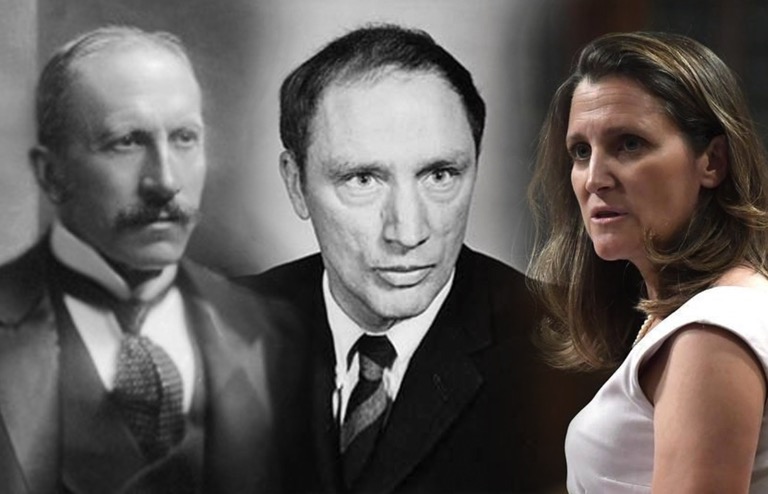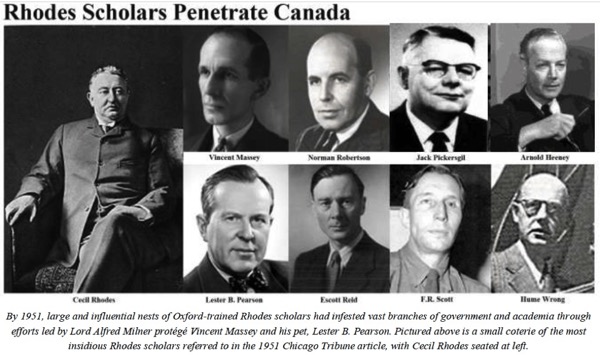by Matthew Ehret
Prologue
Canada’s history has remained clouded in misinformation and outright lies for over 200 years, while basic truths which were once well understood by leading statesmen a century past are now treated as little more than myth or “conspiracy theory”. Yet as the above quote written by the pen of Lord Alfred Milner indicates, the crafting of the Canadian identity has been bought for the price of a national soul. The greatest obstacle to Canadian sovereignty today is found in the fact that Canada’s synthetic identity has been constructed over the past decades with the intention of obstructing the establishment upon this earth of a world of sovereign republics, which was and still is the outgrowth of the success of the American Revolution in 1783. To do so, we must investigate how the Anglo Dutch oligarchy has played through such institutions as the Rhodes Trust, Fabian Society, and Round Table Movement. These structures have played a key role in mis-shaping every key standard of economic, political, cultural and scientific behaviour which has perverted western institutions to this very day and have come to be identified since the election of Donald Trump as “the Deep State”.
Part one of our story focused upon the creation of these institutions and their methods of penetrating their networks throughout influential institutions of Canada from 1865 to 1943, and the evolution of the Round Table into the Royal Institute for International Affairs (RIIA) in 1919. American branches were created in 1920 with the Council on Foreign Relations (CFR) and Institute of Pacific Relations, while a Canadian branch was established in 1928 with the Canadian Institute for International Affairs (CIIA). Key Canadian patriots resistant to the RIIA’s plans were also introduced in the form of “Laurier Liberals” O.D. Skelton and Ernest Lapointe, both of whom aided in influencing the highly malleable Prime Minister William Mackenzie King towards the Canadian nationalist cause, greater cooperation with American Patriots such as Franklin Roosevelt and away from the RIIA’s plans for world government under the League of Nations. With the mysterious deaths of Skelton and Lapointe in 1941, all such resistance melted away and Canadian foreign policy become fully infected by Rhodes Trust/ Fabian agents of the CIIA.
This second segment will address the important 1943-1972 destruction of humanist potential leading up to the reforms implemented by CIIA-assets Lester B. Pearson and Pierre Elliot Trudeau in their role in advancing Milner’s program for a new synthetic nationalism.
The Attack on Post-War Potential Begins 1945-1951
By the end of the war, Canada’s productive capacity had risen to unimaginable heights and the vision of unbounded progress free of imperial monetarism was not far off from realization. The relationship between Canada and the United States was at an all-time high, with exploding trade, and purchasing power that had multiplied threefold from 1939 to 1956. The authority and power won by C.D. Howe was continued into the following 12 years of Canadian progress first, as Minister of Reconstruction (1944-1948) then as Minister of Trade and Commerce (1948-1957). When Howe realized that his resistance to Canada’s participation in the unjust Korean war of 1950 would not work, he changed gears, and took advantage of the situation by renewing his broad war powers, once again allowing himself to lead Canada’s economy top down, resulting in the great projects with America such as the St Lawrence Seaway, the Avro Arrow CF-105 supersonic interceptor, the TransCanada-U.S. natural gas pipeline and especially the civilian use of nuclear power shaped by Canada’s unique CANDU technology. [2]
The secret to Canada’s progress during and after the war continued to be the National Research Council (NRC), re-organized and rehabilitated after years of incompetence under its former President General Andrew McNaughton. The NRC was a flexible top down organization run by one of Howe’s brightest engineering students C.J. Mackenzie who went on to become the first President of Atomic Energy Canada Ltd (AECL).
With similar mission-oriented organizational structures having organically formed in the USA during war, the NRC was celebrated and studied as a model for countries the world over. The leaders of this institution fought not only to advance nuclear power in Canada in order to escape the limits of fossil fuels and accelerate the next breakthrough to thermonuclear fusion, but also led the fight to provide their technology to underdeveloped countries such as India and Pakistan which were yearning to break free of their British colonial masters [3]. The NRC also successfully led breakthroughs in radio astronomy, oceanography and industry. Its basic objective can be summarized in the following model:
(1) Maximize the density of discoveries within a cross country system of self-financed and self-organized intramural NRC laboratories.
(2) Translate those discoveries into new technological applications and machine tools.
(3) Apply these technologies as efficiently as possible into the industrial productive system to increase the productive powers of labour.
(4) Force university curricula and behaviour to adapt by such creative upshifts as quickly as possible ensuring that no fixed/formulaic patterns of thought could encrust themselves upon the minds of students or professors.
Dexter White and Wallace
The Cultural/Economic/Scientific factors of Canada’s post-war dynamic were on a new trajectory of true independence, founded on a commitment to progress which the British Empire now mobilized all of its energy to destroy. The great fear of Lord Milner laid out in 1909 of “union with the United States” guided by unbounded scientific and technological progress was now underway, peaking with a 1948 call for a North American customs union advocated by Howe and leading FDR statesmen in the United States that had not yet been purged by the Cold War witch hunt led by Senator McCarthy. Sadly, now under the vast influence of the British Empire’s mind control, one of Mackenzie King’s last acts in office was the destruction of this proposition. After King’s 1950 death, C.D. Howe continued on as Minister of Trade and Commerce under King’s successor Louis St. Laurent (1948-1957) [4].
Having ensured that FDR’s postwar vision for a world of sovereign nation states would not come to fruition after his untimely death in April 1945, the first of a series of ideological barrages was hammered into Canadian and U.S. policy beginning with the installation of Wall Street tool Harry Truman as President, and with him the advent of the “Truman Doctrine” centering on the Rhodes-Milner agenda of Anglo-American Empire guided by Churchill’s design of “British brains and American brawn”. While FDR was still alive, his allies led by Harry Dexter White and Henry Wallace were capable of fending off John Maynard Keynes’ attempts to structure the Bretton Woods agreements according to his own twisted logic of a one world currency steered by the Nazi affiliated Bank for International Settlements and Bank of England (of which Keynes was a Director). However, after FDR’s death, the last major beachhead of resistance to British recolonization melted.
The Anglo-American “special relationship” was quickly established by Truman bringing American foreign policy quickly under the control of the RIIA networks beginning with Truman’s unnecessary utilization of two of America’s only three nuclear bombs on the already defeated Japan which set the foundations for the Korean War [5]. This policy was ushered in by Sir Winston Churchill’s 1946 “Iron Curtain” speech in Fulton, Missouri which officially opened the age of the Cold War, setting a fear based dynamic of tension that resulted in a purging of FDR allies from positions of influence, and an influx of British operatives into high prominence the world over.
The Chicago Tribune’s Cassandra Sounds the Alarm
In 1951, the enormously influential Massey-Lévesque Royal Commission attempted to first launch an attack upon the “American invasion” of media (print, radio, television and cinema) which was taking over the Canadian psyche. One of the primary demands of the 1951 report called for an emergency ban on U.S. media to keep “dangerous” American cultural influences from contaminating Canada’s British traditions with the following words:
Few Canadians realize the extent of this dependence… our lazy, even abject imitation of them [American institutions] has caused an uncritical acceptance of ideas and assumptions which are alien to our tradition.
Do you find these posts helpful and informative? Please CLICK HERE to help keep us going!


